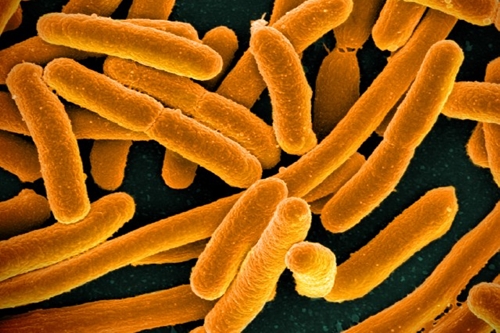17 June 2015. Engineers and medical researchers at Harvard University are designing genetically engineered bacteria that can diagnose and treat gastrointestinal disorders affecting travelers, as well as people suffering from acute or chronic gut diseases. The team from Wyss Institute for Biologically Inspired Engineering at Harvard developing the engineered microbes is funded by a $4.7 million grant from Defense Advanced Research Projects Agency or Darpa, part of the U.S. Department of Defense.
Darpa is seeking a solution to the numbers of people in the armed services who suffer from gastrointestinal disease when encountering unfamiliar bacteria in unsanitary food or water when posted overseas, similar to problems faced by many civilian travelers. The team led by Wyss Institute systems biologist Pamela Silver and staff scientist Jeffrey Way are devising a solution with bacteria similar to those living in the human gut, but designed to detect and counter harmful invading microbes.
Silver, Way, and colleagues are building on earlier work with engineered E coli bacteria, designed to detect chemical signals indicating damaged DNA, causing the bacteria to multiply in the gut leading to inflammation and gastrointestinal distress. The E. coli were altered by inserting a gene from a virus that sometimes attacks the bacteria, but also reacts when exposed to the tell-tale chemicals. This detection capability acts like a switch, making it possible read the on/off state of the gene in fecal samples taken from lab animals.
In the new project, the Wyss Institute team plans to enhance the ability of the engineered bacteria to not only detect chemical signals indicating inflammation, but also attack invading microorganisms to restore a healthy balance to the gastrointestinal system. The researchers envision development of a probiotic treatment, similar to dietary supplements now available to consumers, containing the engineered bacteria for treating gut inflammation in its early stages. The treatments would also be designed to act only under specific microbial conditions inside the body, thus not affecting the environment when eventually expelled.
The team expects to build on another development at Wyss Institute, an artificial gastrointestinal system, or gut-on-a-chip designed as part of another initiative. This device makes it possible to simulate human gut microbes under different conditions for up to several weeks. A central chamber in the device has a layer of human intestinal epithelial cells growing on a porous membrane substrate that recreates the intestinal barrier. The flexible membrane attaches to side walls that stretch and recoil with the aid of an attached vacuum controller.
The project is expected to run for 2.5 years, and involve colleagues from Brigham and Women’s Hospital, a Harvard Medical School teaching hospital, and the J. Craig Venter Institute, conducting research on synthetic bacterial genomes. The following video tells more about the engineered bacteria project.
- Technique Devised for 3-D Immunotherapy Injections
- Genome Editing Company Licenses University Technologies
- Paper-Based Synthetic Bio Sensors, Circuits Developed
- New Coating Material Stops Blood Clots, Bacterial Films
- Chip Emulates Human Airway Muscles to Test Asthma Treatments
* * *


 RSS - Posts
RSS - Posts
You must be logged in to post a comment.